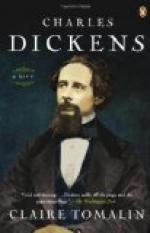In the first week of May, 1868, Dickens was back in England, and soon again in the thick of his work and play. Mr. Wills, the sub-editor of All the Year Round, had met with an accident. Dickens supplied his place. Chauncy Hare Townshend had asked him to edit a chaotic mass of religious lucubrations. He toilfully edited them. Then, with the autumn, the readings began again;—for it marks the indomitable energy of the man that, even amid the terrible physical trials incident to his tour in America, he had agreed with Messrs. Chappell, for a sum of L8,000, to give one hundred more readings after his return. So in October the old work began again, and he was here, there, and everywhere, now reading at Manchester and Liverpool, now at Edinburgh and Glasgow, anon coming back to read fitfully in London, then off again to Ireland, or the West of England. Nor is it necessary to say that he spared himself not one whit. In order to give novelty to these readings, which were to be positively the last, he had laboriously got up the scene of Nancy’s murder, in “Oliver Twist,” and persisted in giving it night after night, though of all his readings it was the one that exhausted him most terribly.[34] But of course this could not last. The pain in his foot “was always recurring at inconvenient and unexpected moments,” says Mr. Dolby, and occasionally the American cold came back too. In February, in London, the foot was worse than it had ever been, so bad that Sir Henry Thompson, and Mr. Beard, his medical adviser, compelled him to postpone a reading. At Edinburgh, a few days afterwards, Mr. Syme, the eminent surgeon, strongly recommended perfect rest. Still he battled on, but “with great personal suffering such as few men could have endured.” Sleeplessness was on him too. And still he fought on, determined, if it were physically possible, to fulfil his engagement with Messrs. Chappell, and complete the hundred nights. But it was not to be. Symptoms set in that pointed alarmingly towards paralysis of the left side. At Preston, on the 22nd of April, Mr. Beard, who had come post-haste from London, put a stop to the readings, and afterwards decided, in consultation with Sir Thomas Watson, that they ought to be suspended entirely for the time, and never resumed in connection with any railway travelling.
Even this, however, was not quite the end; for a summer of comparative rest, or what Dickens considered rest, seemed so far to have set him up that he gave a final series of twelve readings in London between the 11th of January and 15th of March, 1870, thus bringing to its real conclusion an enterprise by which, at whatever cost to himself, he had made a sum of about L45,000.




